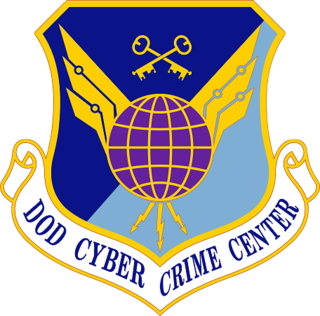
Computer security is the protection of computer software, systems and networks from threats that can lead to unauthorized information disclosure, theft or damage to hardware, software, or data, as well as from the disruption or misdirection of the services they provide.

The SANS Institute is a private U.S. for-profit company founded in 1989 that specializes in information security, cybersecurity training, and selling certificates. Topics available for training include cyber and network defenses, penetration testing, incident response, digital forensics, and auditing. The information security courses are developed through a consensus process involving administrators, security managers, and information security professionals. The courses cover security fundamentals and technical aspects of information security. The institute has been recognized for its training programs and certification programs. Per 2021, SANS is the world’s largest cybersecurity research and training organization. SANS is an acronym for SysAdmin, Audit, Network, and Security.

Cybercrime encompasses a wide range of criminal activities that are carried out using digital devices and/or networks. These crimes involve the use of technology to commit fraud, identity theft, data breaches, computer viruses, scams, and expanded upon in other malicious acts. Cybercriminals exploit vulnerabilities in computer systems and networks to gain unauthorized access, steal sensitive information, disrupt services, and cause financial or reputational harm to individuals, organizations, and governments.
A cybersecurity regulation comprises directives that safeguard information technology and computer systems with the purpose of forcing companies and organizations to protect their systems and information from cyberattacks like viruses, worms, Trojan horses, phishing, denial of service (DOS) attacks, unauthorized access and control system attacks. While cybersecurity regulations aim to minimize cyber risks and enhance protection, the uncertainty arising from frequent changes or new regulations can significantly impact organizational response strategies.

The Federal Office for Information Security is the German upper-level federal agency in charge of managing computer and communication security for the German government. Its areas of expertise and responsibility include the security of computer applications, critical infrastructure protection, Internet security, cryptography, counter eavesdropping, certification of security products and the accreditation of security test laboratories. It is located in Bonn and as of 2024 has about 1,700 employees. Its current president, since 1 July 2023, is former business executive Claudia Plattner, who took over the presidency from Arne Schönbohm.
The University of Fairfax is an institution of higher education headquartered in Salem, Virginia. It offers online graduate degrees in cybersecurity, cloud computing, computer science and engineering, and business as well as several graduate certificates. The entire program is provided via instructor led conference calls and online instruction.
Walsh College is a private college in Troy, Michigan. Founded in 1922 by Mervyn B. Walsh, an accountant with the Thomas Edison Light Company, Walsh College is an upper division undergraduate and graduate institution that provides a transformative business and technology education that combines theory, application, and professional experience to prepare graduates for successful careers.
EC-Council is a cybersecurity certification, education, training, and services company based in Albuquerque, New Mexico.

The Committee on National Security Systems (CNSS) is a United States intergovernmental organization that sets policies for the security of the US security systems. The CIA triad are the three main security goals of CNSS.

Merit Network, Inc., is a nonprofit member-governed organization providing high-performance computer networking and related services to educational, government, health care, and nonprofit organizations, primarily in Michigan. Created in 1966, Merit operates the longest running regional computer network in the United States.

The Department of Defense Cyber Crime Center (DC3) is designated as a Federal Cyber Center by National Security Presidential Directive 54/Homeland Security Presidential Directive 23, as a Department of Defense (DoD) Center Of Excellence for Digital and Multimedia (D/MM) forensics by DoD Directive 5505.13E, and serves as the operational focal point for the Defense Industrial Base (DIB) Cybersecurity program. DC3 operates as a Field Operating Agency (FOA) under the Inspector General of the Department of the Air Force.
The Criminal, Cyber, Response, and Services Branch (CCRSB) is a service within the Federal Bureau of Investigation (FBI). The CCRSB is responsible for investigating financial crime, white-collar crime, violent crime, organized crime, public corruption, violations of individual civil rights, and drug-related crime. In addition, the Branch also oversees all computer-based crime related to counterterrorism, counterintelligence, and criminal threats against the United States.
Carl E. Landwehr is an American computer scientist whose research focus is cybersecurity and trustworthy computing. His work has addressed the identification of software vulnerabilities toward high assurance software development, architectures for intrusion-tolerant and multilevel security systems, token-based authentication, and system evaluation and certification methods. In an invited essay for ACSAC 2013, he proposed the idea of developing building codes for building software that is used in critical infrastructures. He has organized an NSF funded workshop to develop a building code and research agenda for medical device software security. The final committee report is available through the Cyber Security and Policy Institute of the George Washington University, and the building code through the IEEE.
Certified Penetration Testing Engineer (C)PTE) is an internationally recognized cyber security certification administered by the United States–based information security company Mile2. The accreditation maps to the Committee on National Security Systems' 4013 education certification. The C)PTE certification is considered one of five core cyber security certifications.
McAfee Institute is an American professional certification and training organization founded in 2010 by Joshua McAfee. The Institute specializes in providing online education for professionals in the intelligence, investigations, and law enforcement sectors. McAfee Institute offers certifications and training programs in fields such as cyber intelligence, cryptocurrency investigations, open-source intelligence (OSINT), human trafficking investigations, and workplace violence prevention.

The Cyber Security Agency (CSA) is a government agency under the Prime Minister's Office, but is managed by the Ministry of Digital Development and Information of the Government of Singapore. It provides centralised oversight of national cyber security functions and works with sector leads to protect Singapore's Critical Information Infrastructure (CII), such as the energy and banking sectors. Formed on 1 April 2015, the agency also engages with various industries and stakeholders to heighten cyber security awareness as well as to ensure the development of Singapore's cyber security. It is headed by the Commissioner of Cyber Security, David Koh.
The Virginia Cyber Range is an educational and research institute funded by a $4-million grant from the Commonwealth of Virginia to promote education in cybersecurity across the state. Currently, the Cyber Range is based out of the Virginia Tech Corporate Research Center.
The Cybersecurity Maturity Model Certification (CMMC) is an assessment framework and assessor certification program designed to increase the trust in measures of compliance to a variety of standards published by the National Institute of Standards and Technology.
Women in CyberSecurity (WiCyS) is a 501(c)(3) non-profit aimed at supporting the recruitment, retention and advancement of women in cybersecurity. It is a global community of men and women dedicated to bringing talented women and under-represented groups together to fill the cybersecurity jobs gap and make the field of cybersecurity more inclusive.
National Initiative for Cybersecurity Careers and Studies (NICCS) is an online training initiative and portal built as per the National Initiative for Cybersecurity Education framework. This is a federal cybersecurity training subcomponent, operated and maintained by Cybersecurity and Infrastructure Security Agency.








